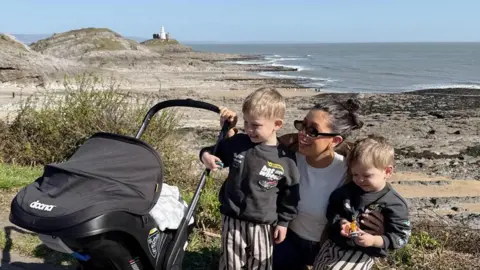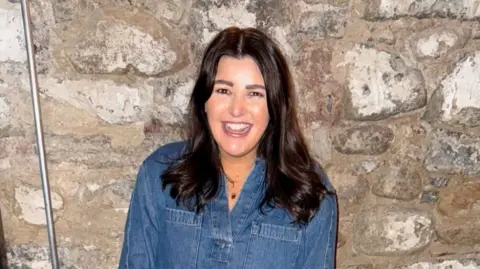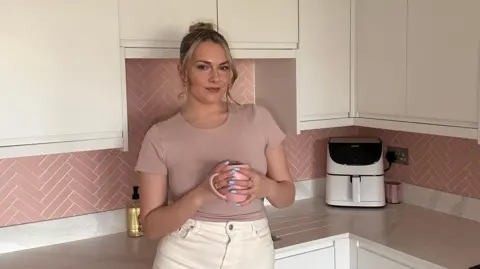The rise of the reset: 'Thousands watch me clean my home each day'
Like many parents, Carys Harding spends a lot of time cleaning up after her kids.
But unlike most, the 27-year-old mum-of-three is watched by thousands online as she scrubs, dusts and declutters her home, as part of a popular social media trend known as a "reset".
With more than 100k followers across TikTok and Instagram, Carys has become one of many full-time influencers who monetise their daily lives.
"I never thought for one minute that the routines and structure that I have in my life would be something people would be interested in," said Carys, from Swansea.
It was after having her second child in 2022 that Carys said she realised she needed to be "another level of organised", and began building an "evening reset" into her routine.
She said each reset involves spending 20 minutes "whipping around" the house, cleaning the surfaces, putting stuff away and getting ready for the next day after her children have gone to bed.
She films herself along the way before editing the videos into short reels which she shares on her social media platforms.
 Carys Harding
Carys Harding"I just love sharing things that are helping me, because being a mum is difficult," said Carys.
"You've got a lot on your plate, you've got a lot to think about."
Carys said being relatable was important to her, adding that her intention was never to make others feel "like less of a person".
"I never want it to come across that I want to keep my house clean for any other reason than it makes my life easier," she said.
"Yes, take inspiration. Yes, use it to motivate you. But please don't look at [my content] and think less of yourself, because if that's happening, then I would suggest you turn away."
 Emily Jones
Emily JonesFellow influencer Emily Jones, from Ammanford, said she tried to be "100% transparent" when sharing time-saving cleaning tips with her more than 13k Instagram followers.
"It tends to be this daily thing of resetting the house, and cleaning and tidying," said the 32-year-old mum-of-two.
"I try and do stuff where if I've got half an hour or I've got an hour where the baby's napping, I'm like 'right, I'm just going to do half an hour' because to me that's what keeps it real and that's what's realistic.
"You can't clean all day. It's just impossible.
"I'm a mum. I'm trying to work at the same time. I've got two young kids. I've got all the things everybody else has going on in their lives."
 Roo Day
Roo DayThere are more than 11m posts on Instagram under the hashtag #cleaning and more than 2.6m for #reset.
With almost 2m followers across Instagram, TikTok, Facebook and YouTube, 30-year-old Roo Day, from Hertfordshire, is one of the most high-profile cleaning influencers in the UK.
Roo shares videos of what she calls "one hour speed cleans", where she sets herself a 60-minute timer and attempts to get as much cleaning done as possible.
"Genuinely to my core I would rather be spending the least amount of time cleaning possible, and I feel like people do also feel that way as well," said Roo.
Roo said the majority of cleaning social media content was created by women, but that a growing number of male influencers were getting involved too.
"I don't think it's mega empowering that I am doing all of this cleaning," she said.
"[But] it just so happens that the split in my household means that I do a little bit more of the cleaning, because I'm not out at a 9 to 5 job all day.
"If we're going to be talking about gender, it shouldn't just be women who are doing it.
"And there's so many male creators now that I watch. In fact, if I see a male and they're like 'reset with me', I'm locked in.
"I love the fact that it is still predominantly female, but a lot of men are getting into it now as well."
'Soothing to the brain'
Dr Stephanie Alice Baker, an associate professor in sociology at City St George's University of London, said cleaning was a role that women had "typically" occupied.
She said creating social media content based upon cleaning therefore offered "a sense of control".
"They can monetise something they'd traditionally have completed as unpaid labour."
Dr Baker said that while lifestyle content was increasing in popularity, audience interest was not new.
"This type of content existed before social media, it's just that social media makes it a lot more accessible," she said.
"The mediums and the audiences have changed but the concerns around self-improvement have existed over generations."
Dr Ceri Bradshaw, a psychologist at Swansea University, said there was a risk that people could be "easily tricked" by snappy, 60-second cleaning videos that in reality take hours of physical work.
"I think we're also easily tricked into thinking that we should be more like the people that we watch," she added.
But Dr Bradshaw said she understood the appeal of watching cleaning content.
"With the cleaning, you're effectively sort of fixing something that needs fixing and it's happening very, very quickly.
"It's quite soothing to the brain."
